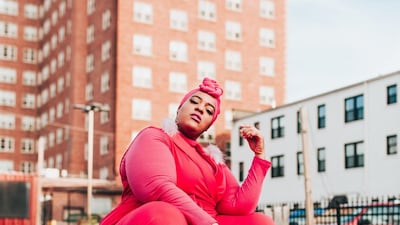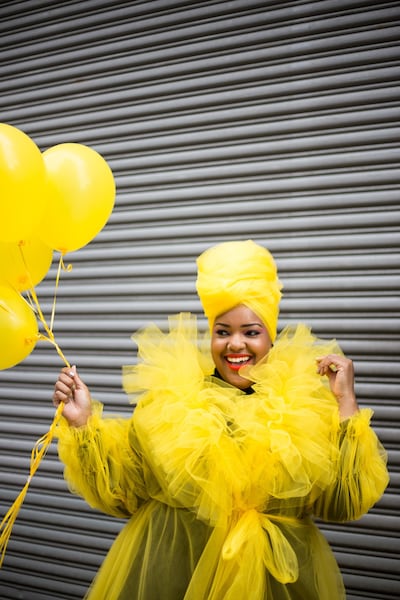"Allah, if you are listening, I need you. I know you have far better things to do, but in my hand, I hold a dress that has sleeves that do not stretch. I'm shook. If you could intervene in some way, that'd be cool. Ameen."
That's not a prayer you often come across in books by Muslim authors, but it's a struggle constantly faced by plus-size model and social media influencer Leah Vernon, who, in her memoir Unashamed: Musings of a Fat, Black Muslim, writes about her difficulties fitting into mainstream clothing and fighting the "fat phobia" she says is ingrained in society. Inclusivity and diversity may be buzzwords of the moment in the fashion industry, but Vernon, 31, believes that while hijab-wearing women may be in the spotlight now, only those who fit a cookie-cutter mould are being tokenised as the new, modern and stylish Muslim woman.
"I call them the 'perfect Instagram hijabi'. They always wear pastels or earth tones. They have the perfect husband and the perfect kids. They are the kind of folks who don't have many worries in life. They are usually white-passing and thin. It's sad how Muslim women have become monoliths. Muslims aren't 'one size fits all,'" Vernon tells The National.
With almost 50,000 followers on Instagram, where she poses in hot-pink feathered ensembles, fluorescent outfits coupled with crystal-studded tiaras, velour tracksuits emblazoned with "Barbie" logos and head-to-toe leopard prints, all completed with colourful turbans, Vernon, with her curvaceous body, lip piercing and non-traditional approach to wearing the hijab, is certainly not your stereotypical Muslim blogger. But while glamorous shoots embodying bold confidence may dominate her social media feed now, Vernon's path to acceptance was paved with hardship, and she bares her life story in Unashamed.
"As a fat, black Muslim who definitely doesn't wear pastels and may or may not cuss like someone's disgruntled uncle, I am overlooked. My voice unheard," she writes, finally giving her story a platform through the publication of her memoir. "A home-schooled black girl from Detroit with way too many issues to name" is how Vernon describes her younger self. Raised by a mother who converted to Islam, had numerous failed marriages and introduced her children to new father figures far too often, Vernon's childhood was unstable, and her relationship with her own father, who abandoned her for his new family, was strained.
Vernon's body is the source of most of her insecurities growing up. She blames her mother for forcing her to wear oversize men's clothing, agonises over her curves while in fitting rooms (the kind that have three-way mirrors), keeps quiet instead of requesting an extender when plane seat belts don't fit around her, and compares herself to celebrity singers like Christina Aguilera and Britney Spears. "Society didn't tell me that I was worthy or cute," she writes. At one point, a doctor tells her she's morbidly obese, and at another, an eating disorder causes her to lose 32 kilos, before she gains it all back plus another 23kg.
But as she grows older, Vernon learns to accept and embrace her body, and tells readers about how she "inadvertently" became a model and social media influencer. "I wish that I could take my 13-year-old self's hand and show her a photo of herself now. Show her how curvy and jiggly and fabulous she looks," she writes.
Insight from Vernon’s therapy sessions are woven into her anecdotes, as she becomes self-confident and emboldened in her advocacy of body positivity. Her prose is candid and colloquial, so much so that it begs the question if the book was ever edited. “I’m the kind of clubber that has no chill. They played a Bey song, and I took my dancing to a level 10. Full-on moves,” reads one section. Vernon says the casual tone of her book is very much intentional.
"When I write, I want the reader to feel like they are sitting in a room chatting with an old friend. I want the reader to get a sense of closeness and that punchiness we experience when we are sitting in a room with the girls having our laughs and sharing personal stories," she explains. "Writing the book was hard. Editing it was even harder. The cutting of parts was the hardest part. I wanted all of my crazy stories to make it."
When she describes getting ready in preparation for a blind date, Vernon writes, "I got semi-dressed up, making sure to wear my Spanx, just in case my stomach rolls scared him." Her weight, after all, is addressed on almost every page, often coming across as self-deprecating, though overall brazen and unapologetic. Her identity as an overweight black woman also tends to overshadow her identity as a Muslim and a hijabi, and while her own beliefs about the headscarf are eventually addressed in Unashamed, this is not a book about the hijab, or about religion, for that matter.
Vernon feels disconnected from the rest of her tightly knit mosque community in America, which she feels holds double standards when it comes to rules for men, who she says may drink alcohol and cheat on their wives at clubs, and women, who she says are judged if they enter a club covered, but in form-fitting clothes.
Throughout the first half of Unashamed, readers experience Vernon's upbringing and young love life through her memories. She married her boyfriend at age 19, but their eight-year relationship was a toxic one. From her husband's conservative ideas about how she should dress to his lack of financial contribution to the household, readers witness the slow deterioration of their marriage.
At one point, verbal abuse turns into physical aggression, culminating in an ugly domestic incident involving a shotgun and a night in jail, where Vernon is forced to remove her hijab for a mugshot.
It took only three months for Vernon to write the whole book, which reads like her personal diary. “I started writing it at the lowest time in my life. I was freshly divorced. No savings. No job. No prospects. I was broken and angry at the world. Angry at how the Muslim community turned their backs on me. Angry at racism and mad at myself for allowing people to treat me like I wasn’t worthy,” she says. “I cried and wrote and cried and wrote some more. Took naps and ate snacks. Then repeated that until it was done.”
Through the promotion of Unashamed and collaborations with international fashion labels, in 2020 Vernon hopes to spread her messages about body positivity and inclusivity across the world – including the UAE.
"I know for a fact that countries in the Middle East have never seen anyone like me and it's time to change up the game," she says. "I am just as Muslim as my Middle Eastern brothers and sisters. I just do things a little different. I am so ready to take my fat, black Muslim self farther in this world."


